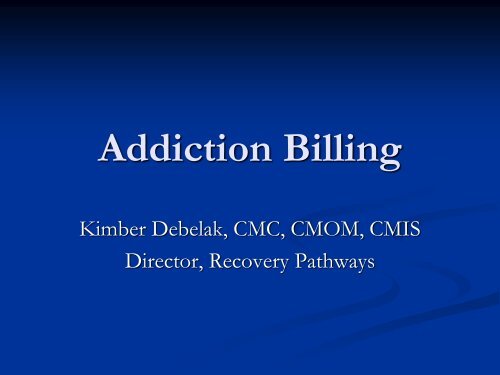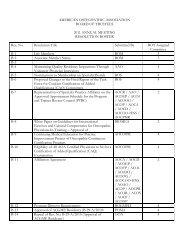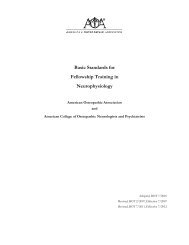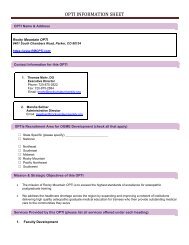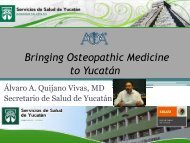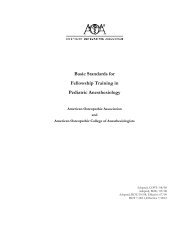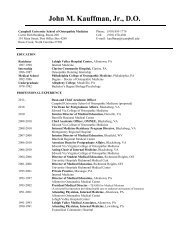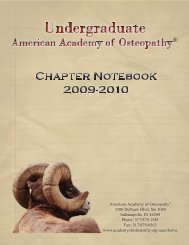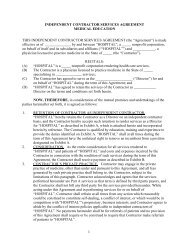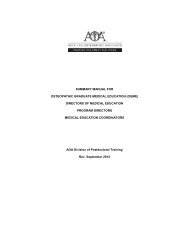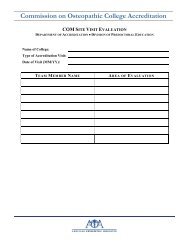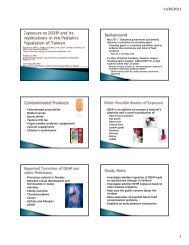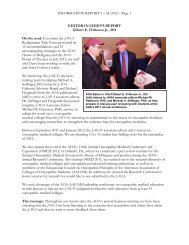Kimber Debelak - American Osteopathic Association
Kimber Debelak - American Osteopathic Association
Kimber Debelak - American Osteopathic Association
Create successful ePaper yourself
Turn your PDF publications into a flip-book with our unique Google optimized e-Paper software.
Addiction Billing<br />
<strong>Kimber</strong> <strong>Debelak</strong>, CMC, CMOM, CMIS<br />
Director, Recovery Pathways
Objectives<br />
• Provide overview of addiction billing contrasting<br />
E&M vs. behavioral health codes<br />
• Present system changes in ICD-9 to ICD-10<br />
codes and sample sets<br />
• Consider changes to ICD-10 coding with<br />
incorporation of DMS-5<br />
• Review sample code set changes
Coding Overview<br />
• CPT codes – the common procedure codes for<br />
the services you provide<br />
• Evaluation and Management (E&M)<br />
• Behavioral Health codes<br />
• ICD-9 codes – the codes used for the diagnoses<br />
of the patient<br />
• ICD-9 codes for all pathologies<br />
• DSM codes must be translated into ICD-9 codes
CPT codes<br />
• Procedure codes for evaluation and management<br />
contain 3 components<br />
• History<br />
• Physical exam<br />
• Medical decision making<br />
• Behavioral health codes<br />
• Based on time<br />
• Inclusions of counseling
Practice Decisions<br />
• Treat addiction within scope of primary care<br />
• Combined with treatment of the co-morbid medical<br />
diagnoses<br />
• Treat addiction outside the scope of primary<br />
care<br />
• Detox centers<br />
• Behavioral health facilities<br />
• Outpatient clinics
Insurance Difficulties<br />
• Even with parity, navigating the insurance<br />
labyrinth in order to be reimbursed for services<br />
provided is difficult<br />
• Know if SA or MH is covered under your NPI<br />
• Know if the insurances you participate with covers<br />
SA or MH treatment for your discipline<br />
• May need to renegotiate your managed care<br />
contracts<br />
• May need to redefine insurances you par with
Provider Types<br />
• Medical<br />
• Primary care<br />
• Specialty and subspecialty<br />
• Psychiatric Ψ<br />
• Behavioral health<br />
• Addiction medicine
Provider Types<br />
• Behavioral health<br />
provider<br />
• Psychiatric CPT<br />
• Psychotherapy<br />
• Med management<br />
• DSM for psychiatric<br />
disease classification<br />
• Substance Abuse services<br />
usually reimbursed<br />
• Contract dependent<br />
• Medical provider<br />
• Use E&M codes<br />
• New vs. established visits<br />
• Uses ICD-9 for medical<br />
diagnosis<br />
• Substance Abuse services<br />
may not be reimbursed<br />
• Contract dependent
E&M Codes<br />
• Mandatory key components<br />
• History<br />
• Physical exam<br />
• Medical decision making<br />
• Other contributing factors<br />
• Counseling<br />
• Coordination of care<br />
• Time (must be face to face)
New Patient E&M<br />
Code 99201 99202 99203 99204 99205<br />
History Problem focused Expanded problem<br />
focused<br />
Detailed Comprehensive Comprehensive<br />
Exam Problem focused Expanded problem<br />
focused<br />
detailed Comprehensive Comprehensive<br />
Decision<br />
making<br />
straightforward Straightforward Low complexity Moderate<br />
complexity<br />
High complexity<br />
Presenting<br />
problem<br />
Self limited or<br />
minor<br />
Low to moderate<br />
severity<br />
Moderate<br />
severity<br />
Moderate to high<br />
severity<br />
Moderate to high<br />
severity<br />
Time 10 min 20 min 30 min 45 min 60 min
Established Patient E&M<br />
Code 99211 99212 99213 99214 99215<br />
History NA Problem focused Expanded<br />
problem<br />
focused<br />
Exam NA Problem focused Expanded<br />
problem<br />
focused<br />
Decision<br />
making<br />
NA Straightforward Low<br />
complexity<br />
Detailed<br />
Detailed<br />
Moderate<br />
complexity<br />
Comprehensive<br />
Comprehensive<br />
High complexity<br />
Presenting<br />
problem<br />
Minimal<br />
Self limited or<br />
minor<br />
Low to<br />
moderate<br />
severity<br />
Moderate to<br />
high severity<br />
Time 5 min 10 min 15 min 25 min 40 min<br />
Moderate to high<br />
severity
Psychiatric Coding: 90801<br />
• 90801 = Diagnostic Interview<br />
• Key components<br />
• History<br />
• Mental status exam<br />
• Disposition<br />
• May include<br />
• Family contact<br />
• Ordering and reviewing of test results
Psychotherapy Coding<br />
• Outpatient codes<br />
• Individual session codes<br />
• Insight<br />
• Behavioral modification<br />
• supportive<br />
Codes 23-30 min 45-50 min 75-80 min<br />
Therapy only 90804 90806 90808<br />
Therapy +<br />
E&M<br />
90805 90807 90809
Med Management coding: 90862<br />
• Patient requires med management only as they<br />
are receiving psychotherapy from different<br />
provider<br />
• Management of detox, maintenance, mood<br />
stabilizing medications<br />
• Usually no E&M service provided<br />
• No time limits<br />
• No quantity limits<br />
• May not require treatment plan
Behavioral Health vs. Primary Care<br />
• Assessment<br />
• 90801<br />
• Psychotherapy<br />
• 90804, 90806, 90808<br />
• Psychotherapy + E&M<br />
• 90805, 90807, 90809<br />
• Medication visits<br />
• 90862<br />
• Group therapy<br />
• 90853<br />
• New patient E&M<br />
• 99201-99205<br />
• Established patient E&M<br />
• 99211-99215<br />
• Counseling + Therapy<br />
• 99211-99215 + >50% time<br />
• Medication Visits<br />
• 99211-99215<br />
• Group Therapy<br />
• Not reimbursed
Buprenorphine vs. Primary Care<br />
• Assessment<br />
• 90801<br />
• Induction<br />
• 90899, H0015<br />
• Psychotherapy + E&M<br />
• 90805, 90807, 90809<br />
• Medication mgmt visit<br />
• 90862<br />
• Group therapy<br />
• 90853<br />
• Assessment<br />
• 99205<br />
• Induction<br />
• 99205-21, H0015<br />
• Counseling<br />
• 99213-99215<br />
• Medication mgmt visit<br />
• 99213-99215<br />
• Group therapy<br />
• Self pay patient<br />
• Hire behavioral health<br />
professional
Reimbursement Comparison<br />
Code Type Blue Cross Medicaid<br />
99213 $77 $28<br />
90805 $55 $38<br />
Based on reimbursement rates in Michigan, retrieved August, 2012.
What is happening to ICD?<br />
• International Classification of Disease (ICD)<br />
• Means of classifying diagnoses<br />
• Must be used when billing insurance companies<br />
• Only diagnostic code set that meets HIPAA and insurer<br />
mandated coding requirements<br />
• Current version is ICD 9<br />
• ICD 10<br />
• Mandated by US Department of Health and Human Services<br />
• Implementation date October 1, 2014
ICD 10<br />
• Code set maintained by WHO<br />
• Version updated<br />
• Increased specificity<br />
• Exponential increase in number of codes<br />
• Used by the majority of the world<br />
• Will allow greater epidemiology with common<br />
worldwide diagnostic language<br />
• Mandatory change
ICD 9 vs. ICD 10<br />
• 3-5 characters in length<br />
• 13,000 codes<br />
• 1 st digit may be alpha or<br />
numeric<br />
• 5 digits long<br />
• Limited space for new<br />
codes<br />
• Lacks detail<br />
• Lacks laterality<br />
• 3-7 characters in length<br />
• 68,000 codes<br />
• 1 st digit is alpha & 2 nd<br />
and 3 rd numeric<br />
• 7 digits long<br />
• Potential space for new<br />
codes<br />
• Very specific<br />
• Has laterality
ICD-10 for Mental Health Disorders<br />
• Separate category (F17) for nicotine dependence<br />
• Subcategories for specific tobacco product used<br />
• ICD-9 currently only has 305.1 for tobacco use<br />
disorder or dependence<br />
• Removes stage of substance use<br />
• No distinction for continuous or episodic<br />
• Unique codes for substance use that separate<br />
from abuse or dependence
ICD-10 for Mental Health Disorders<br />
• Combination codes for drug and alcohol use and<br />
associated conditions such as withdrawal, sleep<br />
disorders or psychosis<br />
• Specific codes related to blood alcohol level<br />
(Y90-)<br />
• More specific codes regarding state of<br />
withdrawal, associated symptoms, and<br />
pathophysiology
How will this affect practice?<br />
• Physicians<br />
• Must increase the specificity of documentation as related to<br />
laterality, stage of healing, episodes of care, etc.<br />
• Clinical: ABN forms, superbills, patient education<br />
• Managers: budgets, training, contract, policies<br />
• Lab: increased specificity of coding and ordering<br />
• Coding and billing: will completely change their world<br />
• Nursing: order form changes, increased documentation<br />
• Front desk: HIPAA forms
DSM-5<br />
• Diagnostic and Statistical Manual of Mental<br />
Disorders fifth edition (DSM-5)<br />
• Scheduled for publication in May 2013<br />
• Undergoing analysis of field trials<br />
• Will bring change to the diagnosis coding of<br />
mental health disorders<br />
• Will need to translate DSM-5 codes<br />
to ICD10 codes for billing in 2013
Timeline of Change<br />
• May 2013 DSM-5 slated for publication<br />
• October 2013 ICD 10 scheduled for<br />
implementation
How can we adapt?<br />
• Must be prepared<br />
• Must accept change<br />
• Must allow for physician and staff training<br />
• Must consider potential delays in billing claim<br />
submission and reimbursement<br />
• Must reformat all current patient forms,<br />
contracts, ordering and billing forms<br />
• Must start NOW!
Code Change Sample<br />
• ICD 9<br />
• 304.0 Opioid type<br />
dependence<br />
• 304.00 unspecified<br />
• 304.01 continuous<br />
• 304.02 episodic<br />
• 304.03 in remission<br />
• ICD 10<br />
• 304.0 Opioid type<br />
dependence<br />
• F11.20 uncomplicated<br />
• F11.20 uncomplicated<br />
• F11.20 uncomplicated<br />
• F11.21 in remission
Code Change Sample<br />
• ICD 9<br />
• Major depressive<br />
disorder single episode<br />
unspecified<br />
• 296.20<br />
• Major depressive<br />
disorder, single episode<br />
without psychotic<br />
features<br />
• 296.33<br />
• ICD 10<br />
• Major depressive<br />
disorder single episode<br />
unspecified<br />
• F32.9<br />
• Major depressive<br />
disorder, single episode<br />
without psychotic<br />
features<br />
• F32.2
Code Set Sample<br />
ICD-10 CODE<br />
CATEGORY<br />
CODE DESCRIPTIONS<br />
F31.1 -Bipolar disorder, current episode manic<br />
without psychotic features<br />
-F31.10 Bipolar disorder, current episode<br />
manic without psychotic features, unspecified<br />
-F31.11 Bipolar disorder, current episode<br />
manic without psychotic features, mild<br />
-F31.12 Bipolar disorder, current episode<br />
manic without psychotic features, moderate<br />
-F31.13 Bipolar disorder, current episode<br />
manic without psychotic features, severe
Code Set Sample<br />
ICD-9 CODE<br />
DOCUMENTATION<br />
331.0 Alzheimer’s disease<br />
294.11 Dementia in<br />
conditions classified<br />
elsewhere with behavioral<br />
disturbance<br />
V40.31 Wandering in<br />
conditions classified<br />
elsewhere<br />
ICD-10 CODE<br />
DOCUMENTATION<br />
G30.9 Alzheimer’s disease,<br />
unspecified<br />
F02.81 Dementia in diseases<br />
classified elsewhere, with<br />
behavioral disturbance<br />
Z91.83 Wandering in<br />
diseases classified elsewhere
Code Set Sample<br />
ICD-9<br />
• 290-294 Organic Psychotic<br />
Conditions<br />
• 295-299 Other Psychoses<br />
• 300-316 Neurotic Disorders,<br />
Personality Disorders and Other<br />
Non-psychotic Mental Disorders<br />
• 317-319 Intellectual Disabilities<br />
ICD-10<br />
• F01-F09 Mental Disorders due to<br />
known Physiological condition<br />
• F10-F19 Substance Abuse<br />
• F20-F29 Schizophrenia & nonmood<br />
disorders<br />
• F30-F39 Mood/Affective disorders<br />
• F40-F49 Anxiety, etc<br />
• F50-F59 Behavioral syndromes due<br />
to physical factors<br />
• F60-F69 Adult personality<br />
disorders<br />
• F70-F79 Intellectual disabilities<br />
• F80-F89 Developmental disorders<br />
• F90-F98 Behavioral/Emotional<br />
disorders, childhood onset<br />
• F99Unspecified mental disorder
References & Resources<br />
• <strong>American</strong> Medical <strong>Association</strong> (AMA)<br />
• http://www.ama-assn.org/ama1/pub/upload/mm/399/icd10-icd9-differences-factsheet.pdf<br />
• <strong>American</strong> Society of Addiction Medicine (ASAM)<br />
• Overview of billing for psych vs. primary care<br />
• <strong>American</strong> Academy of Professional Coders (AAPC)<br />
• How to prepare for ICD-10<br />
• <strong>American</strong> Psychiatric <strong>Association</strong> (APC)<br />
• DSM-5 revisions and updates
Thank You<br />
• For further questions<br />
• <strong>Kimber</strong> <strong>Debelak</strong>, CMC, CMOM, CMIS<br />
• debelakk@gmail.com<br />
• Cell 517-505-6691


